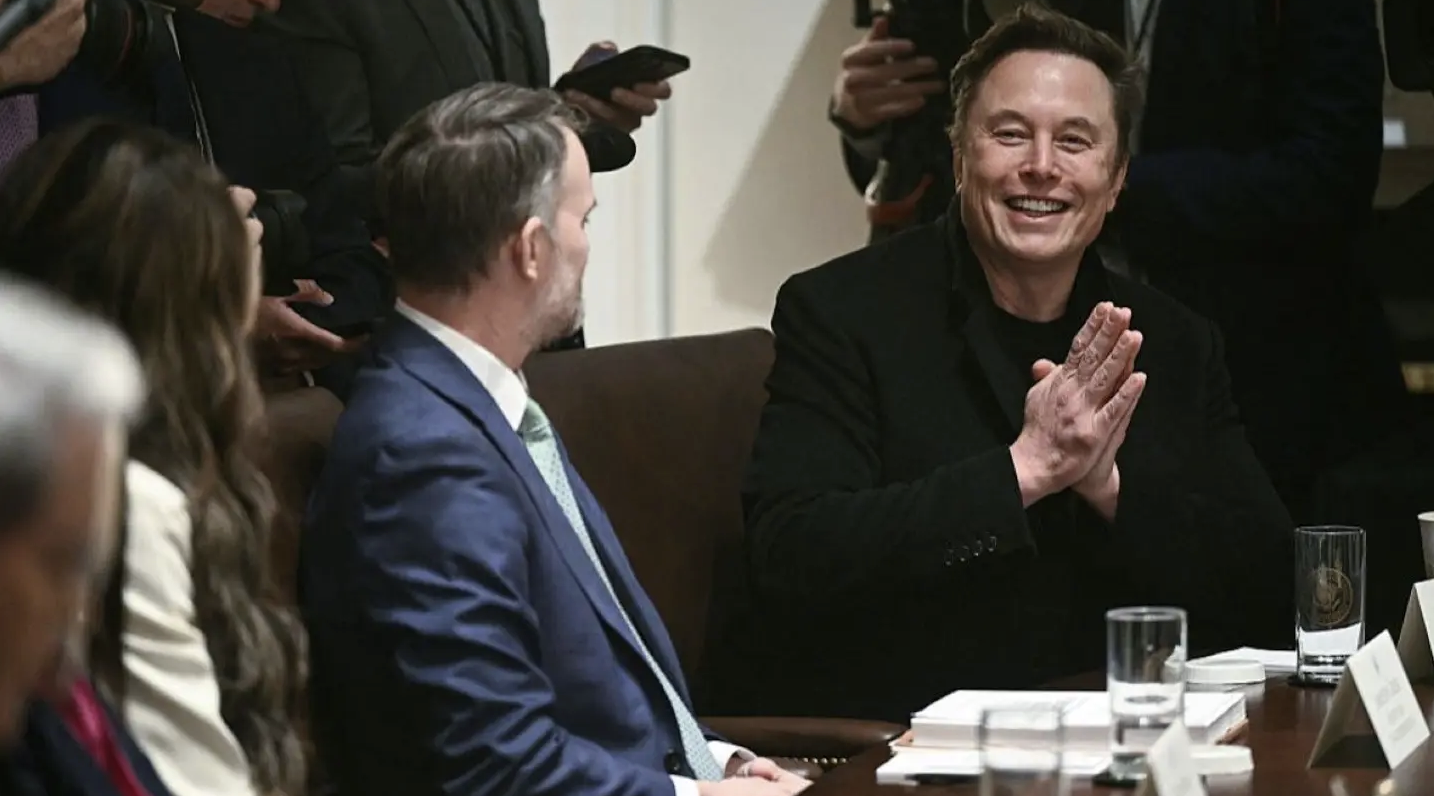No one paying attention to DOGE thinks they are on the up-and-up. If you are a Republican, you think the other side cheats anyway, so this is your side getting theirs. If you are a Democrat, you were suspicious of them from the start. And to be clear, DOGE does itself no favors, but folks are creeping and starting to peer more into the cracks of the inner workings.
Let’s start with their reported savings. What are they, really?
Elon started this endeavor claiming a $2 trillion dollar budget cut. This was quickly lowered to $1 trillion when DOGE started right after Trump’s inauguration. Eyebrows were still raised this week when Elon “bragged” that DOGE will have cut $150 billion… in FY 2026. For the US government, that year starts on October 1st, 2025.
 Elon Musk attends a Cabinet meeting with President Donald Trump in the
Cabinet Room of the White House on April 10, 2025, in Washington, D.C.
(Photo by BRENDAN SMIALOWSKI/AFP via Getty Images)
Elon Musk attends a Cabinet meeting with President Donald Trump in the
Cabinet Room of the White House on April 10, 2025, in Washington, D.C.
(Photo by BRENDAN SMIALOWSKI/AFP via Getty Images)
But hey, projections take some time, and the government often provides its budget information in terms of time span which savings will be realized. Fortunately, DOGE is very transparent and documents their efforts on DOGE.gov. Except, the numbers aren’t adding up. If you go there, it has $150 billion in savings in bold font at the top, but if you actually add up what the website has listed, as of April 1st, it’s only about $90 billion in savings.
Okay, still nothing to sneeze at, right? But… if you dig into the numbers, and look at some of these cancelled contracts, you see some pretty typical “Trump” math. Instead of listing the amount actually saved from a cancelled contract, they used the total potential award in the contract from the amount rather than the amount that is obligated to be spent. Potential award includes the most possible for the contract, including renewals, extensions, and expansions that could have been spent. These additions are not approved.
These contracts also include a “Current award” amount, which is what the government has actually set aside for the contract. If you only look at the amount saved from what the government has actually set aside to spend on a contract, from what has already been spent, then savings on grants, contracts, and leases are only about $12 billion. Brian Banks, a data analyst, has a Substack tracking the savings here. You can also see any cancellations by region here, but this dataset is going by DOGE’s interpretation of savings.
Trump and crew are working every angle they can find to push through their agenda and help DOGE out. Trump is trying to remove the requirement that the public be given notice and opportunity to comment on regulatory changes he wants to put in place. Usually, when agencies seek to change a rule, they have to provide an opportunity for public comment. This process can take a year to complete. Trump is trying to use the “good cause” exception provided in the law to jump the queue. The rule allows agencies to skip this step if doing so would be “impracticable, unnecessary, or contrary to public interest.” Their argument is the regulations are unlawful, therefore keeping them is clearly contrary to public interest. So just like every tariff is due to a national emergency, every regulation is unlawful. How convenient.
Courts also gave DOGE an assist this week when they cleared the way for them to access data at the Department of Education, Treasury and Office of Personnel Management during court challenges.
But what is DOGE doing with all that data?
They claim transparency but are doing everything they can to avoid being subject to FOIA, or the Freedom of Information Act that most government agencies are subject to. The irony? Their effort to carve out an exception only reinforces how deeply embedded the expectation of transparency is. You don’t dodge a rule that doesn’t matter — you dodge one that does.
One agency that is working to audit the auditors, is the Government Accountability Office (GAO). Based on information provided by Wired, the goal seems to be to connect the various data systems managed by different government agencies. Apparently, this week was a planned “hackathon” by the folks at DOGE to develop a “Mega” API to manage and store the data at the IRS on a cloud.
In my day job, I do quite a lot of government work, and data sharing between agencies is painfully difficult if non-existent. It absolutely creates inefficiencies. There is definitely potential here, but there are also contingencies to manage, and good reasons why there are “firewalls” between these agencies. Each agency has its own mission and its own responsibilities. Giving an agency with a conflicting mission access to your data may impede your ability to fulfill your mission. Or, maybe that agency has certain vulnerabilities. If an employee in another agency provides access to another party for this data, it may be a circumstance that’s perfectly in line with their policies, but not with mine. Who violated that policy? There are very wonky and detailed policies that need to be hammered out before these streams are crossed. I’m not saying this isn’t a necessary thing to do at times, but some details, and trust, need to be outlined first, and Trump isn’t looking to use these powers for good.
Trump has already worked to use this in his constant fight against the black and brown people. Some immigrants have been allowed to stay in the US legally under Biden’s immigrant parole program. As part of this program, these immigrants (that are here legally) were given social security numbers so they could work while here. Trump is being stymied in his attempts to just shut the program down DACA-style. So now he is looking to force them to self-deport by reclassifying their social security records to the “deceased” file, which will functionally bar them from accessing an array of financial institutions in the US. Traditionally, Social Security avoided sharing data with ICE for just this reason. Their mission is stymied by immigration enforcement, even more so in instances like this. All this does is stop legal immigrants from working legally and paying into a social security benefit they were likely never going to use.
 Elon gets trolled during a livestream (X/Elon Musk)
Elon gets trolled during a livestream (X/Elon Musk)
Elon made rounds this week claiming to find $400 million in unemployment benefits fraud. Did he? No clue. He also said dead people were getting social security, so I personally need someone else to check his work.
To be clear, it’s possible he discovered it, but likely not new information. There was already a US government group, called the Pandemic Response Accountability Committee, investigating, finding, and reporting on this because there was massive fraud that came with that relief. Is that a government that is inept? I don’t think so.
During the pandemic, the goal was to get relief to people fast, and that included facilitating access to these services. The more barriers to the relief, the harder it would be for people to get it, so some were bypassed during the pandemic while the government prioritized getting relief to people, and I think that was understandable given what was happening. While Elon probably did find a lot of fraud, $794 billion dollars in unemployment benefits were paid out during the pandemic just from March 2020 to July 2021. Assuming the 400 million in fraud came from that, that’s 0.05% of benefits that were paid out. Maybe it’s not from that, but context matters, and the Trump folks aren’t giving people that.
I hate to say this, but once upon a time, I would have been fine with government agencies pulling from one big data set. Aspects of my work would be so much easier, but there is a form of protection in the compartmentalization. And when bad actors are at the helm, you grasp for whatever safeguard you can get. From a policy perspective, there’s value in streamlining systems, consolidating data, and eliminating waste. But that value disappears when the reforms are rushed, selectively reported, or shielded from public accountability.
DOGE isn’t collapsing the system — but they are bending it in ways that make collapse seem like a viable option. They’re not building efficiency; they’re building access — to levers they want to pull without oversight, without resistance, and without the friction of democratic norms.
Maybe some of these changes were overdue. Maybe others could actually make the government better. But when the people holding the tools are cutting corners, dodging transparency, and targeting the most vulnerable just to prove a point — then yeah, we should all be looking a hell of a lot closer at what they’re building.
Because efficiency without accountability? That’s not governance. That’s power — unexamined and unleashed.